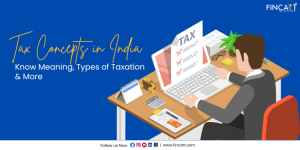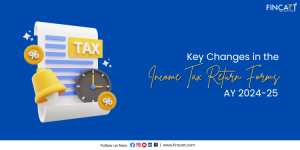The Income Tax Act of 1961 specifies various tax exemptions and deductions available to taxpayers in India. These exemptions and deductions can help reduce your overall tax liability, but they work in different ways. Because both these benefits sound similar, and ultimately lower your taxable income, it’s easy to mix them up. That’s why it is important for taxpayers to understand these concepts and learn the difference between tax exemption and tax deduction to effectively reduce their tax burden legally.
What is a Tax Exemption
There are certain parts of your income that simply cannot be taxed. This amount is excluded from your gross income, which means tax exemptions are not subject to any income tax. Let’s understand this with an example. Suppose Rahul is a salaried individual with a Rs. 14 lakh CTC. His salary structure includes various components like basic salary, dearness allowance, children’s education allowance, hostel allowance, house rent allowance (HRA) and leave travel allowance (LTA).
Some of the components in this case qualify for tax exemptions, while some are either fully or partly taxed. Basic salary and dearness allowance are fully taxed. Children’s education allowance, hostel allowance, and leave travel allowance are exempt from taxation up to a certain limit. If Rahul lives in a rented home, his house rent allowance will also be exempt, however, the exemption is also subject to certain conditions and limits.
Tax exemptions apply to different types of income as specified under the Income Tax Act, and they are applicable to different entities such as individuals, organisations, HUFs, associations etc. Here are some examples of tax exemptions:
- Agricultural Income – Under Section 10 (1), any income earned from agricultural activities is fully exempt from tax. This exemption is very beneficial for farmers and individuals engaged in agriculture.
- House Rent Allowance (HRA) – Employees who live in a rented accommodation can claim an exemption on HRA. The exemption amount is calculated using a complex formula, and those who want to claim this exemption must fulfil specific criteria.
- Leave Travel Allowance (LTA) – LTA is given to employees by companies to cover the travel expenses incurred while on leave. This part of the income is exempt from tax, but like the house rent allowance, this exemption is subject to certain conditions.
- Gratuity – The amount received as a gratuity by employees is also exempt up to a specified limit.
These are just a few examples of the exemptions allowed under the Income Tax Act. Many other exemptions like scholarship income, children’s education allowance, hostel expenses, interest from some government bonds, disability pension, income from Public Provident Fund (PPF) and National Savings Certificates (NSC) can be claimed by taxpayers if they qualify for them.
What is a Tax Deduction?
There are certain investments and expenses that allow you to lower your taxable income. These expenses or investments must be subtracted from your gross income to reduce the amount on which you are taxed. This process is known as claiming tax deductions.
Let’s understand this better by taking a look at how Seema can claim tax deductions. Seema earned Rs. 12 lakh in the financial year, and the nature of her income doesn’t allow her to claim any tax exemptions. Suppose she invested Rs. 2 lakh in an Equity Linked Savings Scheme (ELSS).
Under Section 80C of the Income Tax Act, these types of mutual funds allow individuals to claim up to Rs. 1.5 lakh per year as a tax deduction. Since her investment exceeds this limit, he can claim a maximum deduction of Rs. 1.5 lakh from her taxable income for that financial year, and the remaining Rs. 50,000 of his investment will not be eligible for a deduction under Section 80C. She can simply subtract Rs. 1.5 lakh from her Rs. 12 lakh income and thus reduce her overall tax burden.
The Income Tax Act allows taxpayers to claim deductions on various types of investments and expenses, such as:
- Section 80C – This section allows taxpayers a maximum deduction of Rs. 1.5 lakh for investments in specific financial instruments, such as the Public Provident Fund (PPF), Equity Linked Savings Scheme (ELSS), Employee Provident Fund (EPF), National Savings Certificates (NSC), life insurance premiums, and tax-saving fixed deposits.
- Section 80D – Under this section, individuals and HUFs (Hindu Undivided Families) can claim a deduction on the health insurance premiums they pay for themselves and their loved ones. The amount of deduction that can be claimed depends on the age of the insured and the coverage. Specifically, a maximum deduction of Rs. 25,000 per year can be claimed for premiums paid for oneself, spouse, and children. An additional deduction of Rs. 25,000 can be claimed for premiums paid for parents, which increases to Rs. 50,000 if the parents are senior citizens. If the insurer themself a senior citizen, the limit also rises from Rs. 25,000 to Rs. 50,000.
- Section 80E – If you have taken out an education loan for higher education, either for yourself, your spouse, your children or a student you are the legal guardian of, you are eligible to claim a deduction on the interest component of the loan. This benefit lasts for 8 years, and there is no upper limit to the amount you can claim as a deduction.
- Section 80G – Those who donate to specific charitable organisations and NGOs can claim a tax deduction. The amount of deduction that can be claimed on the type of organisation, and can be either 50% or 100% of the donation amount.
- Section 80U – This section provides a deduction for individuals with a disability. A fixed deduction of Rs. 75,000 is available for individual taxpayers with a normal disability (40% disabled), and Rs. 1.25 lakh for those with severe disability (over 80% disabled). The taxpayer must also have a valid certificate from an appropriate hospital to claim this deduction.
- Section 80TTA – A maximum deduction of Rs. 10 thousand can be claimed on interest earned from savings accounts with banks.
- Section 24 (B) – This section allows you to claim deductions on the interest paid on home loans. You can claim up to Rs. 2 lakh per year for interest on loans if the property is self-occupied. In case the property is rented out, there is no limit on the amount of interest that can be claimed.
An important thing to remember is that the new tax regime, which is the default tax regime, does not allow taxpayers to claim many deductions. If an individual’s expenses and investments are structured in a way that allows them to claim these deductions, they must specifically opt for the old tax regime.
The Key Differences between tax exemption and tax deduction
| Tax Deductions | Tax Exemptions |
| Tax deductions lower your taxable income by subtracting certain expenses and investments. | Tax exemptions, on the other hand, simply remove some specific types of income from being taxed entirely. That means your deductions will be subtracted from your income after exemptions. |
| For example, a maximum tax deduction of Rs. 1.5 lakh can be claimed under Section 80C of the Income Tax Act by investing in instruments such as the PPF, ELSS, EPF, and NSC. | For example, certain types of incomes, like agriculture income, and allowances, such as HRA and LTA are exempt from tax altogether under certain conditions. |
| By offering tax deductions, the government encourages individuals to invest in various financial instruments. This benefits both, the personal financial planning of the taxpayer as well as the broader economy of the country. | Tax exemptions are offered because they promote certain economic activities such as agriculture, and support taxpayers by providing relief in specific situations. |
| Deductions must be subtracted from gross income. | Exemptions are not included in gross income at all. |
Understanding Tax Deduction & Tax Exemption
Let’s see how tax deductions and tax exemptions work with a simple example. Suppose
Ramesh has the following salary structure:
- Basic Salary: Rs. 40,000 per month
- Dearness Allowance: Rs. 25,000 per month
- House Rent Allowance: Rs. 20,000 per month (Ramesh lives in a rented home)
- Transport Allowance: Rs. 3,000 per month
He invested Rs. 70,000 in PPF and Rs. 50,000 in ELSS. Furthermore, he pays a health insurance premium of Rs. 20,000 to cover the health of his family and Rs. 20,000 as education loan interest.
Ramesh’s gross income for the year would be calculated by adding the total parts of his salary: Rs. 40,000 + Rs. 25,000 + Rs. 20,000 + Rs. 3,000 = Rs. 88,000 per month.
Thus Ramesh’s CTC = Rs. 88,000*12 = Rs. 10,56,000.
To calculate the taxable salary, first, we must remove the exempt components of the income. In this case, HRA is exempt as Ramesh lives on rent. LTA has a special condition for exemption. It is only exempt up to Rs. 1,600 per month, so Rs. 3,000 – Rs. 1,600 = Rs. 1,400 of the LTA will be taxed.
Ramesh’s income after exemptions: Rs. 40,000 + Rs. 25,000 + Rs. 1,400 = Rs. 66,400. And yearly: Rs. 66,400*12 = Rs. 7,96,800
Now to calculate the taxable income, we have to look at the possible deductions:
- Standard Deduction: Rs. 50,000 standard deduction is available to all employed individuals
- Section 80C deduction: Rs. 70,000 (PPF) + Rs. 50,000 (ELSS) = Rs. 1,20,000
- Section 80D: Rs. 20,000 deduction
- Section 80E: Rs. 20,000 deduction
Total deductions: Rs. 50,000 + Rs. 1,20,000 + Rs. 20,000 + Rs. 20,000 = Rs. 2,10,000
Ramesh’s taxable income: Rs. 7,96,800 – Rs. 2,10,000 = Rs. 5,86,800
The tax will be calculated on the final amount, after all exemptions and deductions.
Key Insights
To maximise your tax savings, you need to keep a few things in mind:
- Always keep proof of investments and expenses handy. To be able to claim the deductions, you will be required to provide the relevant documents.
- It’s easy to misinterpret the eligibility criteria when dealing with tax exemptions and deductions. Make sure you are eligible for what you are claiming.
- This article contains only a small amount of tax exemptions and deductions available under the Income Tax Act. To fully see what you qualify for, understand all it is important to review all relevant sections of the Act.
- Tax laws always change, especially around the time the annual budget is announced. Be aware of these changes and how they affect the benefits you can claim.
- To maximise your exemptions, you can look at your salary structure and identify components that qualify for tax benefits. You can restructure your salary to include a higher percentage of tax-exempt components of your salary.
- Deductions also have limits. If you invest Rs. 3 lakh in an ELSS, you’d only be able to claim a maximum deduction of Rs. 1.5 lakh. So before you invest, check how your investments fit with your overall tax planning and take advantage of all available deductions to get the best results.
The importance of a professional when dealing with taxes cannot be overstated. A tax advisor can help you keep more of your hard-earned money while making sure you don’t get into trouble with the Income Tax Department.
Tax advisors also make you aware of the various exemptions and deductions that you may not know you are eligible for, and also keep you updated on the changes in tax laws. They can make a personalised long-term strategy that will help you reduce your tax burden every year, and recommend investments that are aligned with your financial goals and risk tolerance.
Don’t fall behind your taxes!
Get in touch with Fincart to handle your taxes and optimize your savings.
Conclusion
The Income Tax Act offers you various tax exemptions and deductions to reduce your tax burden, and taking advantage of these benefits is a crucial part of your tax planning. While tax deductions reduce your taxable income through specific investments and expenses, tax exemptions simply exclude certain types of income from being taxed at all.
When you fully understand how tax deductions and exemptions work, you can structure your income, expenses, and investments in such a way that you minimise your overall tax liability and keep more of your hard-earned money.




